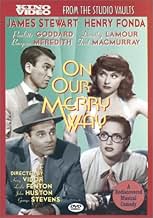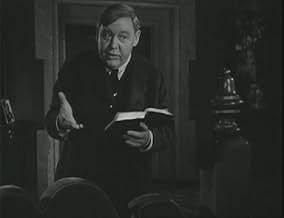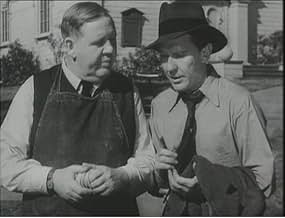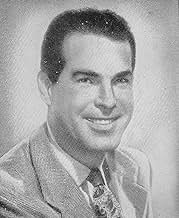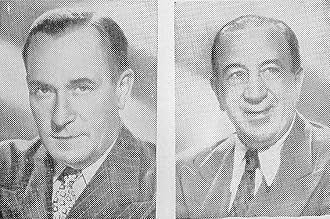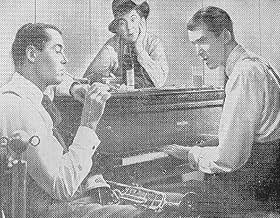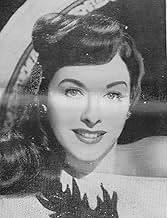IMDb RATING
5.7/10
946
YOUR RATING
Three short stories revolving around the topic of the daily question posed by the roving reporter to the readers of a daily newspaper.Three short stories revolving around the topic of the daily question posed by the roving reporter to the readers of a daily newspaper.Three short stories revolving around the topic of the daily question posed by the roving reporter to the readers of a daily newspaper.
Carl 'Alfalfa' Switzer
- Leopold 'Zoot' Wirtz
- (as Carl Switzer)
Featured reviews
This odd, freewheeling, independently-made compendium film emerges as little more than a glorified home movie (despite the considerable talent involved) but is certainly watchable and entertaining in itself. The linking narrative revolves around married couple Burgess Meredith and Paulette Goddard (at the time hitched in real life): she's an artist and he a lowly employee with a newspaper aspiring to be a journalist; while attempting to flee a creditor, he meets and interviews a number of people about the influence of children in their lives.
The three 'stories' are quite nice with all the various performers contributing generous and relaxed cameos: the first concerns down-and-out musicians Henry Fonda and James Stewart and their involvement in an instrumental contest taking place in a small town (they're all too ready to appease the mayor who has promised them a lot of money if his son is allowed to win but, thanks to the intervention of trumpeter Harry James, a multi-talented girl emerges the clear winner and eventually becomes the owner of Fonda and Stewart's band!); the second finds Dorothy Lamour parodying her former image of a sarong girl (she's a bit player whose opportunity for stardom finally arises out of a disastrous stint in a vehicle for a spoilt child star); the last story, reminiscent of O. Henry's "The Ransom Of Red Chief" (later filmed by Howard Hawks), involves ex-con magician Fred MacMurray and how he and his partner William Demarest stumble upon a boy in the woods and are continually outwitted by him (he's actually fleeing from his eccentric banker uncle but MacMurray eventually discovers his true identity and, in the end, the boy and his elder sister join in on the magic act).
The three 'stories' are quite nice with all the various performers contributing generous and relaxed cameos: the first concerns down-and-out musicians Henry Fonda and James Stewart and their involvement in an instrumental contest taking place in a small town (they're all too ready to appease the mayor who has promised them a lot of money if his son is allowed to win but, thanks to the intervention of trumpeter Harry James, a multi-talented girl emerges the clear winner and eventually becomes the owner of Fonda and Stewart's band!); the second finds Dorothy Lamour parodying her former image of a sarong girl (she's a bit player whose opportunity for stardom finally arises out of a disastrous stint in a vehicle for a spoilt child star); the last story, reminiscent of O. Henry's "The Ransom Of Red Chief" (later filmed by Howard Hawks), involves ex-con magician Fred MacMurray and how he and his partner William Demarest stumble upon a boy in the woods and are continually outwitted by him (he's actually fleeing from his eccentric banker uncle but MacMurray eventually discovers his true identity and, in the end, the boy and his elder sister join in on the magic act).
Down-on-his-luck newspaper ad-man, working the lost-and-found desk, creates a reporting opportunity for himself wherein he polls everyday citizens with an innocuous yet potentially interesting question, "What affect has a child had on your life?" (this is immediately rectified to 'baby' when posed to two jazz musicians). In the prologue, co-producer and star Burgess Meredith is awfully pushy trying to ingratiate himself to the audience; he and Paulette Goddard make for a curious married couple (to say the least), but they're not around enough to cause too much damage. Still, this overlong compendium involving stammering music-partners, a would-be movie actress, and two traveling showmen fails to touch upon anything personal or provocative. It is initially nice to see Henry Fonda and James Stewart sharing the screen, yet their comedic episode is silly and annoying. Production vales high, cast is game, but there are so few laughs that one may think the filmmakers were actually trying for something meaningful. Sadly, there is no substance or depth on display. *1/2 from ****
This three-vignettes-in-a-frame movie is not all bad. Indeed, the first segment features Henry Fonda and James Stewart in a brilliant comic pas de deux which leaves you wondering why they didn't become a cinematic pair. Given that the plot-ette they work with is unremarkable, their joint performance is even more of a miracle and a treat. Also fun is the little jazz score, which features not only Stewart doing his own tasteful piano comping, but also a guest appearance by Harry James, who not only provides the behind-the scenes music of the trumpet-playing "babe" but actually puts his mug in as well.
The second story is a bit weaker, though Dorothy Lamour does a song and dance number that sends up contemporary Hollywood clichés in a wittily sophisticated manner.
The last sequence, however, is truly lame: the pacing is slow and all the actors (especially child actor David Whorf) are annoying. The zany Hugh Herbert nicely finesses a small role but his little performance can't save the segment.
The frame itself is also uninspired, but not so deadly that it drags the film down.
Had the last two segments been as marvelous as the first, this entire movie would have been a classic. But in any case, you simply must see it for the Steward-Fonda collaboration. They command the film from the moment the camera turns on them and never disappoint.
The second story is a bit weaker, though Dorothy Lamour does a song and dance number that sends up contemporary Hollywood clichés in a wittily sophisticated manner.
The last sequence, however, is truly lame: the pacing is slow and all the actors (especially child actor David Whorf) are annoying. The zany Hugh Herbert nicely finesses a small role but his little performance can't save the segment.
The frame itself is also uninspired, but not so deadly that it drags the film down.
Had the last two segments been as marvelous as the first, this entire movie would have been a classic. But in any case, you simply must see it for the Steward-Fonda collaboration. They command the film from the moment the camera turns on them and never disappoint.
As the "Trivia" section states, Charles Laughton was in the original version of this film under its title "A Miracle Can Happen". His was a sequence of 20 minutes or so which came between the Fonda/Stewart story and the one with Fred MacMurray which ended the movie. During the war, Laughton had taken to reading from great works of literature, including the Bible, to invalided US servicemen. He continued to give reading tours after the war and his appearance in "A Miracle Can Happen" was clearly an attempt to put one of his Bible readings on film. He played a washed-out minister who bores his congregation to tears, but one rainy night a small boy asks Laughton to visit his sick father. In an attempt to boost the dying man's spirits, Laughton rises to the occasion with an over-the-top delivery of the Saul and David story that completely revitalises the father. It then turned out that the little boy who invited Laughton in, but who has now disappeared from the scene, had died some years earlier. So, as Laughton told Meredith at the end of the sequence, "a miracle happened."
For whatever reason, the Laughton sequence was deleted from the US release but not before prints has been sent abroad to other countries. Consequently, it has long been known that, for example, a Spanish version of "A Miracle Can Happen" - with Laughton and all the others dubbed into that language - has been seen on TV in Spain and is now available there on DVD, complete with the original English dialogue.
With Laughton having been deleted, the Dorothy Lamour sequence was added in as a replacement, and the film was duly re-titled "On Our Merry Way." I agree with the sentiments expressed by others who find this film an embarrassment all round. Fonda and Stewart are no masters of farcical comedy and neither are any of the other principals. As for Laughton in the original film, his hamming up of the Bible story has to be seen to be believed. Nevertheless, both versions are of some interest because of the talents involved but I agree with anyone who says that once you've seen either version you're not likely to want to see them again!
For whatever reason, the Laughton sequence was deleted from the US release but not before prints has been sent abroad to other countries. Consequently, it has long been known that, for example, a Spanish version of "A Miracle Can Happen" - with Laughton and all the others dubbed into that language - has been seen on TV in Spain and is now available there on DVD, complete with the original English dialogue.
With Laughton having been deleted, the Dorothy Lamour sequence was added in as a replacement, and the film was duly re-titled "On Our Merry Way." I agree with the sentiments expressed by others who find this film an embarrassment all round. Fonda and Stewart are no masters of farcical comedy and neither are any of the other principals. As for Laughton in the original film, his hamming up of the Bible story has to be seen to be believed. Nevertheless, both versions are of some interest because of the talents involved but I agree with anyone who says that once you've seen either version you're not likely to want to see them again!
Before I committed to buying the DVD of "On Our Merry Way," I got it from Netflix and happy I am that I did so, for it's not likely I'd ever want to watch it again. "On Our Merry Way" is an anthology film in the manner of "O. Henry's Full House," but while the latter has a no-nonsense framework with John Steinbeck introducing the episodes, "On Our Merry Way" uses the gimmick of Burgess Meredith talking directly to the camera every so often. It doesn't work; it seems more like a vanity project for Meredith and his then wife Paulette Goddard.
Nor do the stories work. They are shaggy dog stories that bore you long before they reach a conclusion. The Henry Fonda-James Stewart and Fred MacMurray-William Demarest episodes are simply not funny. "On Our Merry Way" is full of overacting (especially from Carl "Alfalfa" Switzer) and shtick (from Victor Moore and Hugh Herbert). Dorothy Lamour, on the other hand,comes off extremely well both as an addle-pated secretary and then with a song that satirizes her own career; for Lamour it's a triumph over inferior material.
John O'Hara is credited for one of the stories, O. Henry is not, even though his "The Ransom of Red Chief" serves as the basis for the MacMurray-Demarest episode; for comparison, watch the Fred Allen-Oscar Levant take on the same story in "O. Henry's Full House." It's only minimally better but it moves faster.
It's inconceivable to me that so many great directors, credited or un-, would produce such a mess.
One can't help be grateful to Kino for clearing the copyright problems which had long kept the film in limbo; after all, we do want to preserve the work of our great stars, no matter how bad. But once our curiosity is satisfied, "On Our Merry Way" becomes a shelve-it-and-forget-it film.
For a much better pairing of Meredith and Goddard, I'd recommend Jean Renoir's English-language version of "The Diary of a Chambermaid."
Nor do the stories work. They are shaggy dog stories that bore you long before they reach a conclusion. The Henry Fonda-James Stewart and Fred MacMurray-William Demarest episodes are simply not funny. "On Our Merry Way" is full of overacting (especially from Carl "Alfalfa" Switzer) and shtick (from Victor Moore and Hugh Herbert). Dorothy Lamour, on the other hand,comes off extremely well both as an addle-pated secretary and then with a song that satirizes her own career; for Lamour it's a triumph over inferior material.
John O'Hara is credited for one of the stories, O. Henry is not, even though his "The Ransom of Red Chief" serves as the basis for the MacMurray-Demarest episode; for comparison, watch the Fred Allen-Oscar Levant take on the same story in "O. Henry's Full House." It's only minimally better but it moves faster.
It's inconceivable to me that so many great directors, credited or un-, would produce such a mess.
One can't help be grateful to Kino for clearing the copyright problems which had long kept the film in limbo; after all, we do want to preserve the work of our great stars, no matter how bad. But once our curiosity is satisfied, "On Our Merry Way" becomes a shelve-it-and-forget-it film.
For a much better pairing of Meredith and Goddard, I'd recommend Jean Renoir's English-language version of "The Diary of a Chambermaid."
Did you know
- Trivia"A Miracle Can Happen" was the original title of this film when released on Feb. 3, 1948 at the Warner Theater in Manhattan. It consisted of three short stories (about 20-25 minutes each) linked by the Burgess Meredith character. He played a reporter looking for a good scoop, and in the second sequence, Charles Laughton played a bible-reading minister. When it was released nationally in June, however, it had been decided that the religious story would be dropped and replaced by a more comic one featuring Dorothy Lamour. The film in this new version was then re-titled "On Our Merry Way". However, prints of the original film had already been sent abroad for dubbing. In Spain, "A Miracle Can Happen" became "Una Encuesta Llamada Milagro", complete with the original Laughton sequence intact (but without the alternative Lamour story). As it has been released on DVD there and retains the English-language soundtrack, the movie can be seen as it was originally intended.
- Alternate versionsThe version released in Spain and always seen on both TV and DVD, in dubbed and subtitled versions (bearing the title card "A Miracle Can Happen"), includes the Charles Laughton episode but not the Dorothy Lamour one.
- ConnectionsFeatured in Henry Fonda: The Man and His Movies (1982)
- How long is On Our Merry Way?Powered by Alexa
Details
- Runtime
- 1h 47m(107 min)
- Color
- Aspect ratio
- 1.37 : 1
Contribute to this page
Suggest an edit or add missing content

